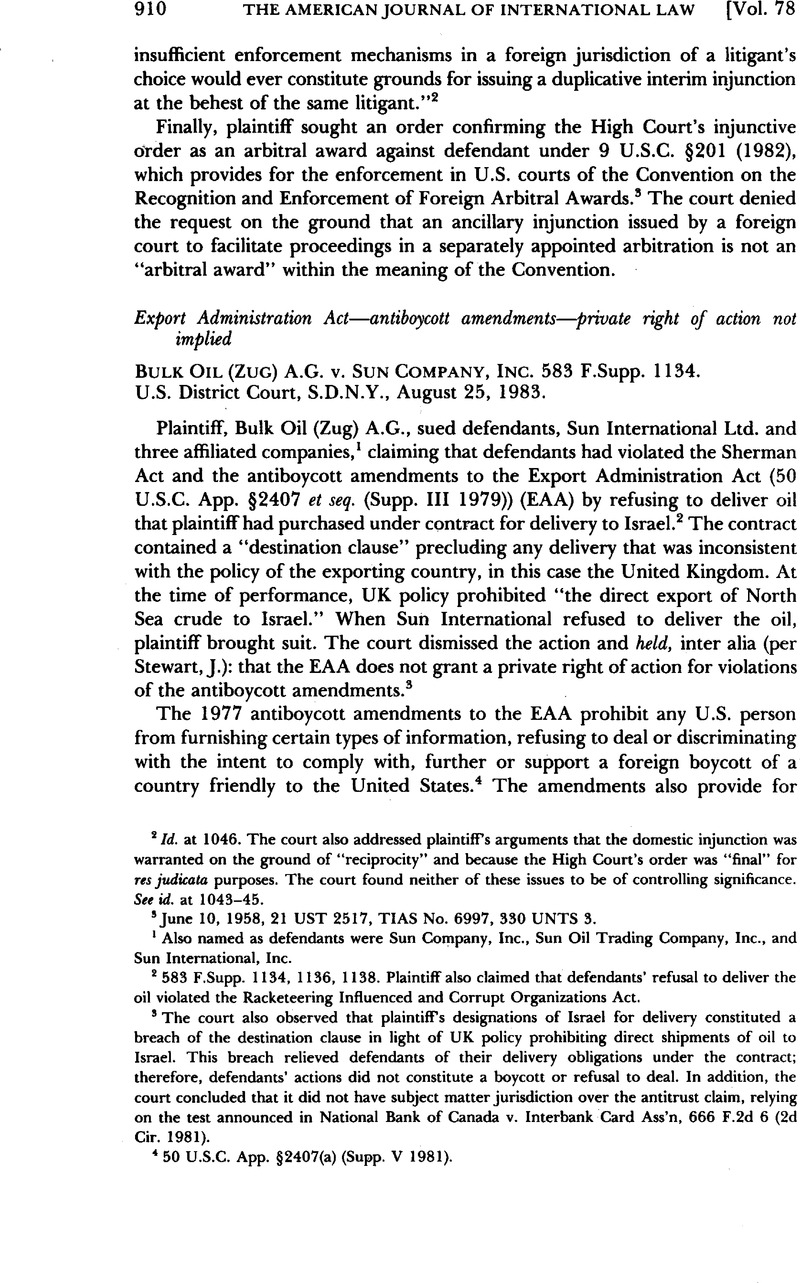No CrossRef data available.
Published online by Cambridge University Press: 16 May 2017

1 Also named as defendants were Sun Company, Inc., Sun Oil Trading Company, Inc., and Sun International, Inc.
2 583 F.Supp. 1134, 1136, 1138. Plaintiff also claimed that defendants' refusal to deliver the oil violated the Racketeering Influenced and Corrupt Organizations Act.
3 The court also observed that plaintiffs designations of Israel for delivery constituted a breach of the destination clause in light of UK policy prohibiting direct shipments of oil to Israel. This breach relieved defendants of their delivery obligations under the contract; therefore, defendants' actions did not constitute a boycott or refusal to deal. In addition, the court concluded that it did not have subject matter jurisdiction over the antitrust claim, relying on the test announced in National Bank of Canada v. Interbank Card Ass'n, 666 F.2d 6 (2d Cir. 1981).
4 50 U.S.C. App. §2407(a) (Supp. V 1981).
5 Id. §2410(a)-(c).
6 422 U.S. 66 (1975).
7 583 F.Supp. at 1140.
8 638 F.2d 282 (2d Cir. 1980), affd sub nam. Merrill Lynch, Pierce, Fenner & Smith, Inc. v. Curran, 456 U.S. 353 (1982).
9 Section 11(g) states, in relevant part, that "[n]othing in subsection (c), (d), or (f) [civil penalty sections] limits . . . the availability of other administrative or judicial remedies with respect to violations of this Act . . . or any regulation, order, or license issued under this Act. . . ." 50 U.S.C. App. §2410(g)(l) (Supp. V 1981).
10 583 F.Supp. at 1142, referring to two examples where the Senate decided to include express powers in the EAA rather than leave them to implication: (1) the power to collect a fine by withholding or suspending export licenses or privileges, and (2) the right of persons to contest the imposition of penalties. See S. REP. No. 363, 89th Cong., 1st Sess., reprinted in 1965 U.S. CODE CONG. & AD. NEWS 1826, 1831. The court concluded that since a private right of action for damages is at least as important as these powers, Congress must not have intended to leave such right to implication. See National R.R. Passenger Corp. v. National Ass'n of R.R. Passengers, 414 U.S. 453, 458 (1974).
11 581 F.Supp. 1570 (S.D. Tex. 1984) (suit by Jewish doctors claiming that Baylor College had discriminated against them by refusing to allow their participation in a professional program in Saudi Arabia).
12 Id. at 1581.
13 Id.